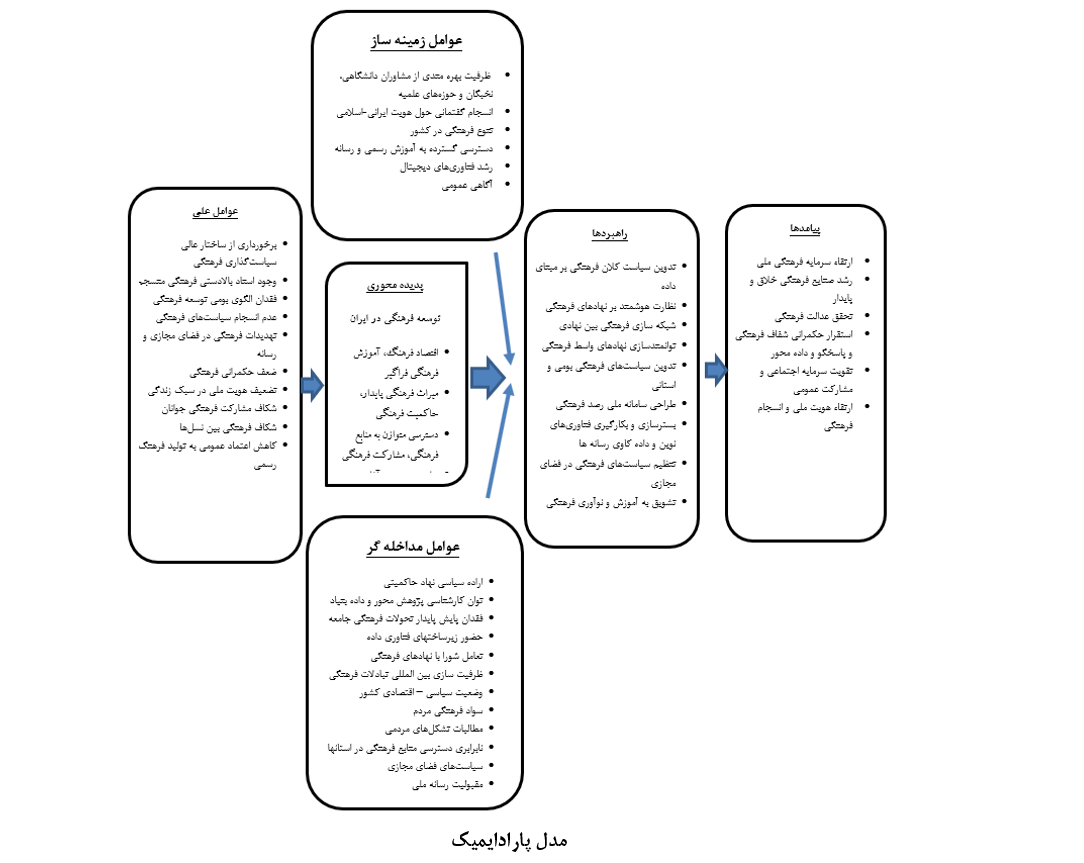Designing a Cultural Development Model in Iran with an Emphasis on the Role of the Supreme Council of the Cultural Revolution: Introducing the Cultural–Structural Alignment Theory in the Path of Cultural Development in Iran
Keywords:
Cultural Development, Supreme Council of Cultural Revolution, Iran.Abstract
This study aims to design a comprehensive cultural development model in Iran emphasizing the role of the Supreme Council of the Cultural Revolution and to propose a localized theory of cultural–structural alignment. The research is applied–fundamental and qualitative in nature, conducted using the grounded theory method based on the Strauss–Corbin approach. The statistical population consisted of 20 cultural policy experts and senior managers of the Supreme Council of the Cultural Revolution, selected purposefully until theoretical saturation was achieved. Data were collected through semi-structured interviews and documentary analysis and analyzed using open, axial, and selective coding. Construct validity and reliability were verified through expert confirmation and acceptability criteria. Analysis revealed 94 conceptual codes and 41 categories organized into five dimensions: causal, contextual, intervening, strategic, and consequential. The core phenomenon, “Cultural Development in Iran,” included concepts such as cultural economy, inclusive cultural education, sustainable cultural heritage, cultural governance, cultural participation, gender equality, and freedom of choice. Key strategies included data-driven macro-cultural policymaking, local and provincial policy design, development of a national cultural observatory system, and intelligent monitoring of cultural institutions. The main consequences identified were the enhancement of national cultural capital, cultural justice, social participation, and data-based cultural governance. The findings led to the formulation of the “Cultural–Structural Alignment Theory,” positing that sustainable cultural development in Iran depends on achieving alignment between societal cultural values and formal governance structures. Mutual interaction and dynamic adaptation between people’s cultural norms and policymaking institutions are essential for realizing a cohesive and progressive cultural framework.
Downloads
References
Tāherpour Kalāntarī H. National Culture Development Model in Upstream Documents. Journal of Management Process and Development. 2023(124):123-66. doi: 10.61186/jmdp.36.2.123.
Shouhānī M, editor Investigating the Status of Education in the Country's Cultural Development. First National Conference on Teaching Skills; 2024; Masjed Soleyman.
Sardārī N, Keshtkār P, Bāgherī S, Alī Mīrzālou F, editors. The Role of Education in the Cultural and Social Development of Society. First International Conference on New Horizons in Education in the Third Millennium; 2023; Bushehr.
Hātemī S, Zolfaghārī A, Manṣūrī Awwal A. The Role of Education in Social and Cultural Development. Islamic Research and Studies. 2019;1(1):59-65.
Yuan H. Empowering Effective Literacy Instructions for Multi-Cultural English Language Learners. US-China Education Review. 2017;7(7):348-57. doi: 10.17265/2161-623X/2017.07.004.
Choi J-S, Kim J-S. Effects of cultural education and cultural experiences on the cultural competence among undergraduate nursing students. Nurse Education in Practice. 2018;29(4):159-62. doi: 10.1016/j.nepr.2018.01.007.
Rezaei A, Ebrāhīmpour A, Karīmī M. Presenting a Cultural Development Model with a Tourism Approach for Shiraz City Using Grounded Theory. Intercultural Studies. 2024(59):171-90.
Jān'alīnezhad A, Bāy A, Mazrū'ī K. Barriers and Strategies for Achieving Cultural Development in the Islamic Republic of Iran. Law and Politics Quarterly. 2024;6(3):75-85. doi: 10.61838/csjlp.6.3.6.
Mas'ūdī Markhālī S, editor Development Culture and Cultural Development. First International Conference on Information Technology, Management, and Computer; 2024; Sari.
Butt A, Faisal I, Petri H, Jussi K. Strategic design of culture for digital transformation. Sciencedirect. 2024. doi: 10.1016/j.lrp.2024.102415.
Zhang W, Wen Z, Xiaoshuang Z, Huigang L, Yajiong X. Understanding How Organizational Culture Affects Innovation Performance: A Management Context Perspective. 2023. doi: 10.3390/su15086644.
Mīr S, Malekiān N, Torbatī S, Mīr O. Investigating the Causes of Cultural Underdevelopment in the Country. News Sciences. 2020(33):104-19.
Singer N. Bridging Cultural Gaps Through Mass Communication: The Role of Digital Media in Transforming English Language Teaching and Cognitive Development. Arab World English Journal. 2025;16(1):27-42. doi: 10.24093/awej/vol16no1.2.
Baldan Babayiğit B, Sever D, ÇAm AktaŞ B, KİP KayabaŞ B, ŞEnel EA, GÜVen M. Professional Development for Multicultural Education: Lessons from a Blended In-Service Teacher Training Programme. TEACHING AND TEACHER EDUCATION. 2025;165. doi: 10.1016/j.tate.2025.105151.
Li M. An examination of two major constructs of cross-cultural competence: Cultural intelligence and intercultural competence. Personality and Individual Differences. 2020;164(4):110-05. doi: 10.1016/j.paid.2020.110105.
Shliakhovchuk E. After cultural literacy: new models of intercultural competency for life and work in a VUCA world. Educational Review. 2019:1-22. doi: 10.1080/00131911.2019.1566211.
Ezzatzādeh M. Cyber Social Networks and Cultural Development. Iranian Social Development Studies. 2020;13(1):81-91.
Zalloom B. Cultural Dynamics of Gendered Spaces: Behavioral Influences in Amman's Outdoor Areas. International Journal of Sustainable Development and Planning. 2024;19(3):909-16. doi: 10.18280/ijsdp.190309.
Shīrdel H, editor Analysis of Effective Stakeholders in the Social and Cultural Development of Kerman Province. National Conference on Social and Cultural Development in Iran: Challenges and Capabilities; 2021.
Behzādi K, Razavī HR, Emām Gholīzādeh S. A Study Identifying the Components of Cultural Development: A Qualitative Study on Cultural Centers with a Hierarchical Analysis Approach. Islamic Art Studies. 2021(43):91-101.
Ghadamī M, Ebrāhīmzādeh S, Ghayyūmī A. Presenting an Excellence Model for Cultural Development with a Focus on Creating a Creative Class of Children and Adolescents. Intercultural Studies. 2019(40):73-100.
Patterson‐Stephens S. Creating to Transgress: Supporting Student Leadership Development Through Culturally Informed Media Praxis. New Directions for Student Leadership. 2025;2025(185):97-105. doi: 10.1002/yd.20661.
Oberguggenberger AS, Nagele E, Inwald EC, Tomaszewski K, Lanceley A, Nordin A, et al. Phase 1-3 of the cross‐cultural development of an EORTC questionnaire for the assessment of sexual health in cancer patients: the EORTC SHQ‐22. Cancer medicine. 2018;7(3):635-45. doi: 10.1002/cam4.1338.

Downloads
Published
Submitted
Revised
Accepted
Issue
Section
License
Copyright (c) 2025 Khosro Doosti (Author); Rozita Sepehrnia (Corresponding author); Esmaeil Kavousi, Fatemeh Azizabadi Farahani (Author)

This work is licensed under a Creative Commons Attribution-NonCommercial 4.0 International License.










